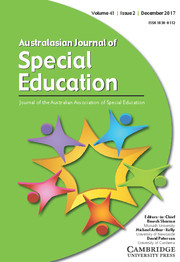No CrossRef data available.
Article contents
The Effect of Word Study and Cognitive Strategy Training on Students’ Spelling Abilities
Published online by Cambridge University Press: 26 February 2016
Abstract
There is mounting evidence to support the belief that not all students learn to spell by immersion in reading and writing alone. The intervention to teach spelling described in this paper combines the direct instruction in the study of words together with the use of spelling in an integrated language system. Students in a regular classroom were categorised into three groups (good spellers; average spellers and poor spellers including those identified as average to good readers). Specific areas explored included students’ attitudes, knowledge and spelling ability in isolation and in context. Results suggested the intervention was effective for all students, especially in terms of their knowledge about the language system, strategies and their own spelling misconceptions.
- Type
- Research Article
- Information
- Copyright
- Copyright © The Australian Association of Special Education 2000


